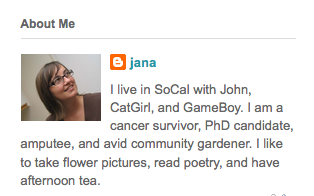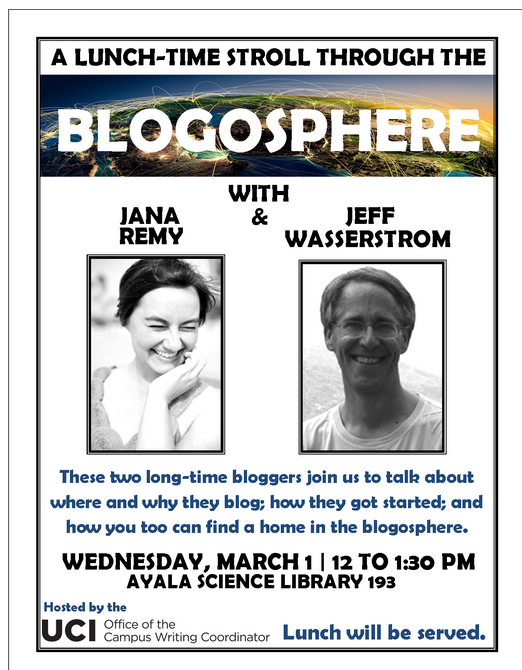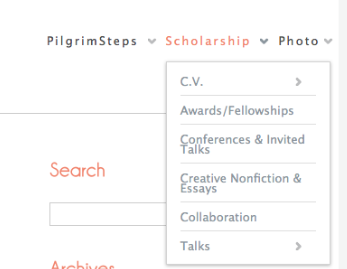 Recently I logged into blogger.com while I was teaching a workshop, and when I did so my legacy bio from 2005 popped up onto the screen in front of the audience. It was a bit embarrassing to see my just-barely-in-grad-school self on that big screen and to realize just how much time has passed in the interim. I don’t live with any of those people anymore (I’m over 6 years divorced from John and the kiddos both live in their own apartments in different cities from me) and I’ve long since finished my Ph.D. While I still enjoy my afternoon cuppa and I do spend a lot of my discretionary time gardening, I rarely define myself by those hobbies. Of course I am still a cancer survivor and I am still am amputee, but I would probably not advertise those aspects of myself in front of an audience while I was speaking on a professional topic.
Recently I logged into blogger.com while I was teaching a workshop, and when I did so my legacy bio from 2005 popped up onto the screen in front of the audience. It was a bit embarrassing to see my just-barely-in-grad-school self on that big screen and to realize just how much time has passed in the interim. I don’t live with any of those people anymore (I’m over 6 years divorced from John and the kiddos both live in their own apartments in different cities from me) and I’ve long since finished my Ph.D. While I still enjoy my afternoon cuppa and I do spend a lot of my discretionary time gardening, I rarely define myself by those hobbies. Of course I am still a cancer survivor and I am still am amputee, but I would probably not advertise those aspects of myself in front of an audience while I was speaking on a professional topic.
This is a pretty good example of how the internet doesn’t forget much, despite the fact that I’ve rather strategically moved my URLs around enough that my decades-ago blogwriting is not so easily discoverable. It still happens often that near-strangers will mention to me that “they’ve been reading my blog…” and I am left feeling like I’ve just left my junior high school diary open on a park bench.
So perhaps this is the perfect segue to an announcement about the talk that I’ll be giving at my alma mater on March 1st. It will be an opportunity to reminisce a bit about my life as a blogger along with my colleague Jeff Wasserstrom. If you’re interested in hearing some of my stories (including, perhaps, how it felt to have my decades-old blogger bio pop up in my workshop last week), please consider yourself invited to join in!
(And it is not without a large feeling of fondness that I note the location of this event is one of my former favorite UCI study haunts, which is now named after my best-ever UCI Bio prof).


